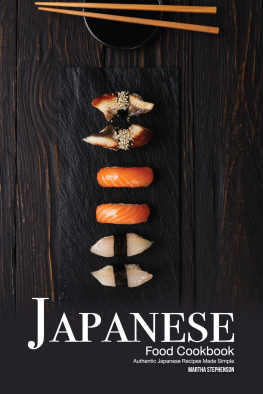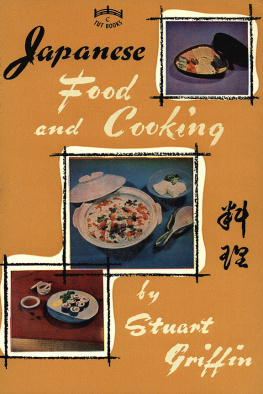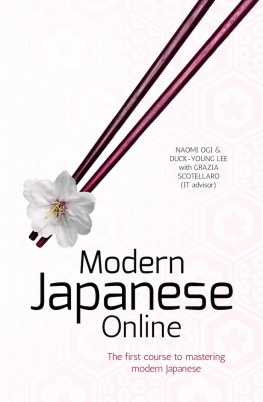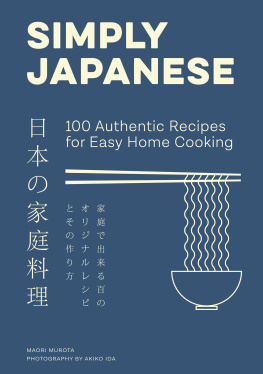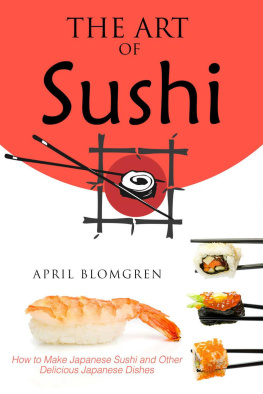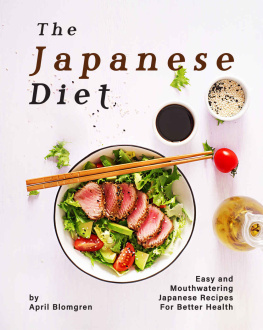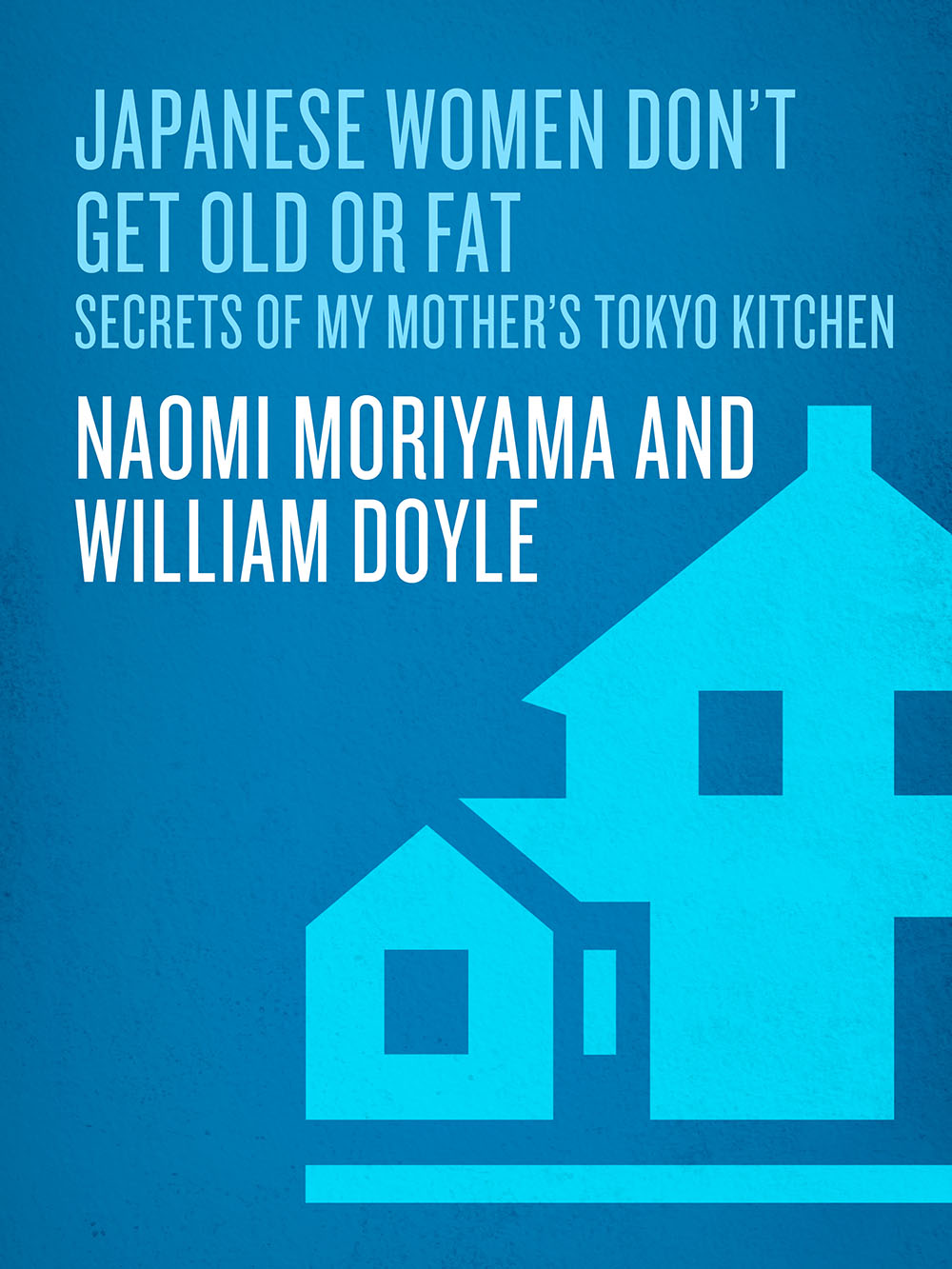
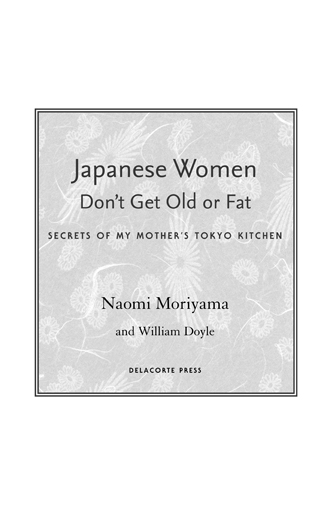
This publication is intended to provide helpful and informative material on the subjects addressed. It is sold with the understanding that the authors and publisher are not engaged in rendering medical, health, or any other kind of personal professional services in the book. The reader should consult his or her medical, health, or other competent professional before adopting any of the suggestions in this book or drawing inferences from it. The authors and publisher specifically disclaim all responsibility for any liability, loss, or risk, personal or otherwise, which is incurred as a consequence, directly or indirectly, of the use and application of any of the contents of this book.
JAPANESE WOMEN DONT GET OLD OR FAT
A Delacorte Press Book / November 2005
Published by Bantam Dell
A Division of Random House, Inc.
New York, New York
All rights reserved
Copyright 2005 by Naomi Moriyama and William Doyle
Family crests from Snow, Wave, Pine: Traditional Patterns in Japanese Design, photographs by Sadao Hibi, text by Motoji Niwa, translated by Jay W. Thomas
Published by Kodansha International Ltd., 2001
Courtesy of Kodansha International Ltd.
Delacorte Press is a registered trademark of Random House, Inc.,and the colophon is a trademark of Random House, Inc.
Library of Congress Cataloging-in-Publication Data
Moriyama, Naomi.
Japanese women dont get old or fat: secrets of my mothers Tokyo kitchen /
by Naomi Moriyama and William Doyle.
p. cm.
Includes bibliographical references.
1. Reducing diets. 2.Cookery, Japanese. 3.NutritionJapan.
4. Food habitsJapan. 5. JapaneseHealth and hygiene.
6.WomenHealth and hygieneJapan. I. Title.
RM222.2 .M569 2005
641.5952 22 2005053795
www.bantamdell.com
eISBN: 978-0-440-33601-3
v3.0_r1

Contents

Introduction
I just want to get healthy.
I want to take better care of myself.
I would like to start eating healthier. I don't want all that pasta.
I would like to start eating Japanese food.
Bill Murray as Bob Harris,
in Sofia Coppola's Lost in Translation
THERE IS A LAND where women live longer than everyone else on Earth.
It is a place where obesity is the lowest in the developed world.
Where forty-year-old women look like they are twenty.
It is a land where women enjoy some of the world's most delicious food, yet they have obesity rates of only 3 percentless than one third that of French women... and less than one tenth that of American women.
It is a country of women obsessed with enjoying lifeand mastering the art of healthy eating. It is a highly industrialized nation that is the second-largest economic power in the world.
The country is Japan.
And something incredible is happening there.
JAPAN AND THE GLOBAL OBESITY EPIDEMIC
Right now, the world is suffering an obesity crisis that is afflicting hundreds of millions of people.
In 2004, the World Health Organization (WHO) declared a global obesity epidemic, with more than 1 billion adults overweightand at least 300 million of them obese, with obesity defined as having a body mass index, or BMI, of over 30. Obesity, announced the WHO, is a major contributor to the global burden of chronic disease and disability.
The WHO reports that the obesity epidemic is rapidly spreading beyond the United States and Western Europe into Eastern Europe, Latin America, the Middle East, and the developing world. It's universal, said Neville Rigby, policy director of the WHO's International Obesity Task Force. It has become a fully global epidemic, indeed, a pandemic.
There is scientific debate over the exact number of deaths attributable each year to obesity, but there is little dispute that a public health crisis is under way.
The news is alarming, and it's getting worse:
A striking 34 percent of adult American women are obese. More than 20 percent of American men, and English and German men and women, are obese.
Obesity in French women and men climbed from approximately 8 percent in 1997 to 11 percent in 2003, an increase of almost 40 percent.
The U.S. National Institutes of Health estimates that obesity and overweight cost the nation an estimated $117 billion in direct medical costs and indirect costs, such as lost wages due to illness. This is more than double the current federal budget for homeland security.
In a June 2, 2005 press briefing, Dr. Julie Louise Gerberding, director of the U.S. Centers for Disease Control and Prevention, linked obesity to an increased risk of hypertension, diabetes, renal failure, colon cancer, postmenopausal breast cancer, gallbladder cancer, uterine cancer, arthritis, sleep disturbances and breathing problems, as well as to problems with childbearing and premature birth.
The state of California alone estimates its obesity-related costs at $21.7 billion a year, leading its health and human services secretary to declare in 2005 that the obesity epidemic is more than a public health crisis, it is an economic crisis.
Obesity in U.S. children has tripled in the last quarter century. It boggles my mind, said Dr. William Klish, head of the department of medicine at Texas Children's Hospital. When I started in the 1960s and early '70s, he told the Associated Press in early 2005, we never ever saw a case of type 2 diabetes, adult-onset diabetes, in children. Now, we're making the diagnosis routinely.
In Australia, surgeons are struggling to cope with the demand for lap-band stomach operations for obese children. I think epidemic's almost too polite a word, Dr. George Fielding told the Royal Australasian College of Surgeons conference in 2005. He prefers to call it a plague. Children of twelve, thirteen, and fourteen are all getting the diseases their grandparents have, he said, they're getting diabetes, high blood pressure, sleep apnea, and heart disease at rates that would be unbelievable ten years ago.
The aircraft manufacturer Boeing is reengineering its designs to accommodate heavier passengers and resulting higher fuel costs. The new Boeing 7E7 aircraft, due in 2008, will feature wider aisles and seats and new structural material designed, in the words of a Boeing spokesperson, to counteract the increasing weight of passengers.
But in the midst of this global obesity crisis, the nation of Japan has managed to become, by several key criteria, the healthiest nation in the world.
Japanese have the lowest obesity rates
in the developed world.
Obesity is defined as a body mass index (BMI) of 30 or higher. The following table shows the percentage of obese adults in various developed nations.
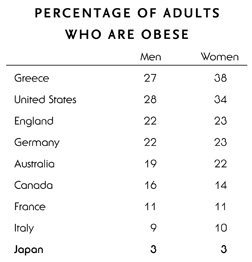
Japanese women are the world champions of longevity.
Japan has become the Land of Immortal Women. According to the Associated Press, in 2004, Japanese women set a new record for the world's longest life expectancy, retaining the title for the nineteenth straight year.
Next page

